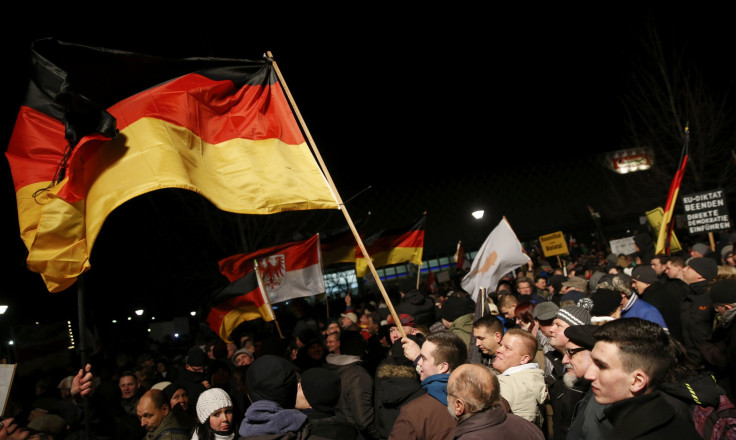Dresden's PEGIDA Movement: How Germany's Anti-Muslim Protesters Are Using Charlie Hebdo To Recruit Followers

A growing anti-Muslim movement in Germany is using the Charlie Hebdo massacre to recruit followers in an effort that has alarmed German leaders and raised questions about the country's tolerance for non-European immigrants. What's unclear is whether Pegida (a German acronym for Patriotic Europeans Against the Islamization of the West) will be able to win over mainstream followers and cement its status among Germany's many political groups focused on immigration amid the growing anti-Muslim backlash spreading across Europe since last week's terror attacks in Paris.
Pegida held its largest rally to date Monday, less than a week after the fatal shooting at Charlie Hebdo's Paris office, with more than 25,000 people marching across Dresden to protest Muslim immigrants in Germany. That marked an increase of more than 7,000 from the group's previous rally the week before. Pegida's growing popularity comes as nearly all of Germany’s main political parties, including Angela Merkel’s conservative Christian Democratic Union, have shifted toward the left over the last six election cycles, according to a 2013 WZB Berlin Social Research Center study. That has left many in overwhelmingly conservative Dresden, in the formerly Communist east, feeling like they have lost their political voice, something Pegida has seized on.
“In the next few weeks and months, they’re going to try to build a legitimate movement,” said Alexander Clarkson, a lecturer in German and European Studies at King’s College in London. “They are going to motivate a lot of people who might feel that if they don’t go out on the street then they’ll slowly get pushed out of the political spectrum. But if they don’t win now, I think this will sort of be the Alamo for them. It’s their last shot.”
The Pegida rally Monday drew all kinds of people, with businessmen and families marching down the streets of Dresden alongside known activists of the National Democratic Party, the far-right, allegedly neo-Nazi party that led similar marches in the 1990s. Many protesters were adamant that they did not support Nazis, but had legitimate concerns that the political establishment hadn't answered over Germany’s growing immigrant population.
“If you look at a lot of the people at Pegida rallies, they look like normal, everyday people. That tells you that there is some deeper malaise underneath all this,” said Dr. Henning Meyer, editor-in-chief of the progressive journal Social Europe and a research associate at the London School of Economics. “It’s a wider section of the population that feels alienated and insecure, that the media doesn’t report things properly, that politicians don’t take them seriously and that political correctness means the real debates aren’t had.”
Germany is the second most popular destination in the world for immigrants behind the United States. Roughly 1.2 million people emigrated to Germany in 2013, and many Germans, including Merkel, have expressed concern that immigrants are coming to take advantage of the country's generous welfare programs. Instability in recent years has pushed hundreds of thousands of people from war-torn Syria, Iraq and across the region to apply for asylum in Germany. Last year, 180,000 applied, up 57 percent from 2013, according to Reuters.
Pegida was founded in October 2014 in Dresden by 41-year-old businessman Lutz Bachmann after he witnessed a clash between supporters and opponents of the Kurdistan Worker’s Party, a separatist rebel group banned in Turkey. His Pegida colleague Kathrin Oertel has said immigrants must not be allowed to import foreign conflicts into Germany.
Many Pegida protesters stress that all immigrants are welcome, but only under the condition that they assimilate into German culture and do not abuse Germany’s liberal immigration policies. “We want to keep our culture, to keep our traditions, to keep our Christian values,” Pegida spokesman Udo Ulfkotte told RT.
Bachmann's first rally in October drew only 350 people, but the crowds have grown exponentially with each week. As the group became more more visible, Germans demanded their national leaders respond. Facing widespread backlash, conservative leaders rushed to denounce the rallies, leaving Pegida with little mainstream backing. At one recent anti-Pegida demonstration, more than 22,000 people protested the group's anti-Muslim views. In Berlin, Merkel joined a Muslim solidarity rally this week, telling the crowd that "hatred of foreigners, racism and extremism have no place in our country."
Dresden has long been an epicenter for far-right groups in Germany, beginning soon after the fall of the Berlin Wall in 1989, when many East Germans were left jobless and adrift during reunification and the transition to capitalism. At the time, rallies led by the National Democratic Party drew thousands to the streets, but Dresden’s politicians eventually pulled their support for the movement after business leaders complained.
Clarkson, who grew up in Hanover, Germany, recalled the clashes in the 1990s between the left and right-wingers in Leipzig, a former East German city 50 miles away from Dresden. The leftists prevailed, Leipzig has been generally liberal ever since, he said. He suspects many of Pegida’s now-middle-aged followers are the same right-wing youth who felt alienated after the NDP fell out of favor. He predicted the tide will likely eventually turn against Pegida, too.
“I think a lot of people in Dresden are getting embarrassed by this,” he said.
© Copyright IBTimes 2024. All rights reserved.





















